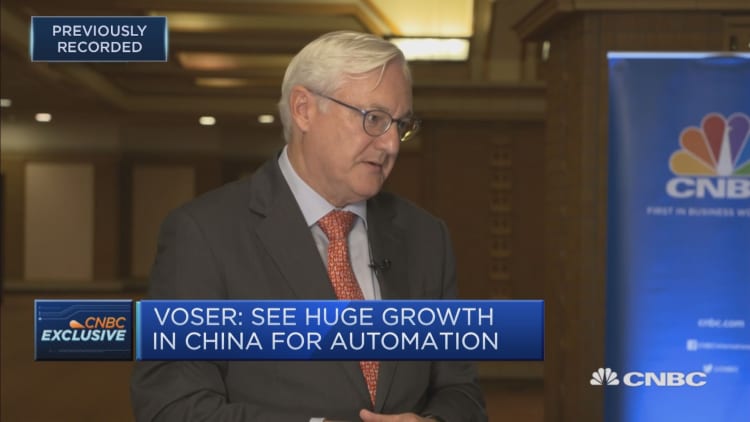
Automation will be a major driver for industries in the future, so companies will need both robots and a gamut of related manufacturing technologies, according to the chairman of multinational tech firm ABB.
Last month, the company announced that it will invest $150 million to build an advanced robotics factory in Shanghai where robots will make other robots. It is expected to begin operations by the end of 2020 and will also have an onsite research and development center to pursue innovations in artificial intelligence.
ABB's latest investment in China comes at a time when growth prospects for the world's second-largest economy appears to be slowing amid an ongoing trade fight with the United States.
But ABB Chairman Peter Voser told CNBC's Akiko Fujita that the decision to invest in the robotics factory was influenced by growing automation needs across industries.
"What will be driving the industries in the future is going to be automation, towards autonomous manufacturing," Voser said at the Nikkei Global Management Forum in Tokyo. "For that, you need robots, but it's not just the robot itself as a product — but you need also end-to-end solutions for manufacturing. That's why we are building this factory."
China is the world's largest robot market, according to the company.
Voser said the factory will serve the Chinese market where the manufacturing sector has a "great need to automate."
Part of that need will likely be driven by Beijing's push for Made in China 2025, an ambitious industrial policy that aims to locally develop high-end technologies to catch up with Western rivals such as the U.S. and Germany.
China has historically used its manufacturing capacity to employ the country's massive population in factories that made goods for the rest of the world. But, following decades of growth, rising wages started consuming profits that pushed companies to consider alternate regions for manufacturing, such as Southeast Asia.
That led Chinese President Xi Jinping to call for a so-called "robot revolution" in manufacturing a few years ago, to boost productivity. Moreover, the country's aging population made it necessary for Beijing to start looking at automation as a viable alternative.
Last summer, China called on domestic firms to make more robots. A widespread move toward automation could potentially have a massive impact on the country's workforce: In 2016, the World Bank said its research predicted about 77 percent of existing jobs in China will be threatened by automation. Such a prospect could have serious economic consequences.
On the trade front, Voser said ABB is "less affected by some of the trade discussions" that are ongoing since the company manufactures and sells locally. It produces up to 90 percent of the products it sells in China within its borders, the chairman said. For the United States, that number is up to 70 percent.
So far, the U.S. has levied tariffs on an extensive list of Chinese products. Beijing, for its part, responded with duties on products from the U.S.
— CNBC contributor Joshua Bateman contributed to this report.


